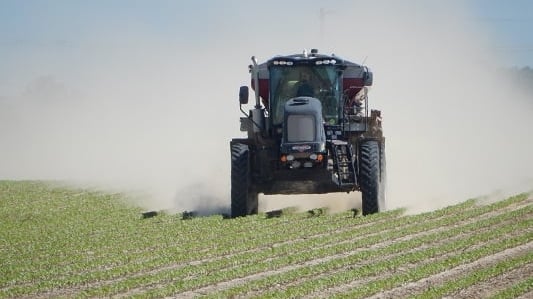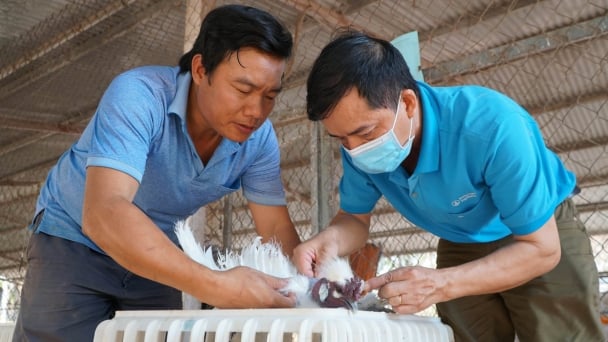May 14, 2025 | 17:44 GMT +7
May 14, 2025 | 17:44 GMT +7
Hotline: 0913.378.918
May 14, 2025 | 17:44 GMT +7
Hotline: 0913.378.918

Resources for agricultural production are getting scarcer, particularly severe negative impacts of climate change, which poses great challenges especially in the context of complicated developments of the COVID-19 pandemic.
Reducing food loss and waste is not only an economic and environmental concern but also an imperative morality. The Food Security and Nutrition Report 2020 of the Food and Agriculture Organization of the United Nations (FAO) shows that around 690 million people in the world are still suffering from starvation, about 2 billion facing food shortage and malnutrition, and 144 million children under 5 years of age are malnourished.
Vietnam always accompanies the international community to achieve the United Nations Sustainable Development Goal (SDG) of halving food loss and waste by 2030, highly appreciates China's initiatives to reduce food loss and waste, including the “Clean Your Plate” campaign started in 2013 to minimize lavish parties and receptions.
In particular, the Law on Anti-Food Waste of China issued in April 2021 set the legal basis to establish a basic code of conduct and build a lasting mechanism, in order to prevent food waste and at the same time to encourage communities, people to create sensible and healthy eating habits.
Being one of the economic pillars, Viet Nam’s agricultural sector has played an important role in ensuring food security for nearly 100 million people, stabilizing livelihoods for over 60% of the population still living in rural areas, contributing to socio-economic development. In 2020, despite being heavily affected by the COVID-19 pandemic, Viet Nam's agricultural, forestry and fishery export turnover reached $41.53 billion, contributed to nearly 15% GDP of the country.
The Government of Viet Nam highly considers the need for close coordination among countries to gradually create positive changes and reduce food loss and waste. Vietnam was the first country in Southeast Asia to commit and implement the National Action Plan for Zero Hunger by 2025, which included the national target of “zero food loss and waste". In addition, Vietnam is committed to continuing the direction of low-carbon agriculture and sustainable growth.
To contribute to the national target of reducing food loss and waste, the Vietnam Ministry of Agriculture and Rural Development of Vietnam set some priorities as follows:
Revising the policies to promote high-tech agriculture, accelerate the rate of mechanization and in-depth processing, increase added value and reduce food loss and waste;
Promoting national and international innovation networks towards green transformation of the economy and building a low-carbon food system; step-by-step applying precise technology in agriculture, approach of ecology, circular economy; integrating the application of science and advanced technology to process and utilize agricultural by-products effectively;
Encouraging digital transformation, digital development in agriculture and logistics services to improve the capacity of food distribution and to reduce food loss. Encouraging and supporting people and businesses to get on skills in application of e-commerce and online business...
"Reducing food loss and waste needs to be targeted to green recovery, ensuring food security and nutrition to adapt to the “new normal”. Vietnam highly appreciates China's initiatives and efforts and is committed to accompanying the international community in the development process, sustainable development of food systems, contributing to the response to climate change and for the achievement of the Sustainable Development Goals (SDGs) by 2030", said Minister Le Minh Hoan
Translated by Linh Linh

(VAN) Vietnam's draft amendment to Decree No. 156 proposes a mechanism for medicinal herb farming under forest canopies, linking economic development to population retention and the sustainable protection and development of forests.

(VAN) In reality, many craft village models combined with tourism in Son La have proven effective, bringing significant economic benefits to rural communities.

(VAN) The international conference titled Carbon Market: International experiences and recommendations for Vietnam was successfully held recently in Ho Chi Minh City.

(VAN) According to the Project on rearranging provincial and communal administrative units, in 2025, the country will have 34 provinces/cities, 3,321 communes, wards, and special zones, and no district-level organization.

(VAN) The vice president of fertilizer with Stone X Group says the Trump administration’s tariffs are impacting fertilizer markets.

(VAN) Resolution 57 offers Vietnam a significant opportunity to narrow the global genetic technology disparity and convert its extensive genetic resources into commercial advantages.

(VAN) The Ministry of Agriculture and Environment will prioritize the implementation of five core and breakthrough solutions in science and technology, in addition to the seven groups of tasks identified in Decision No. 503.